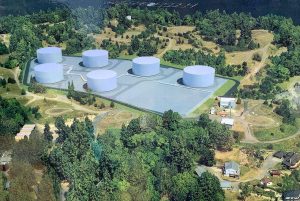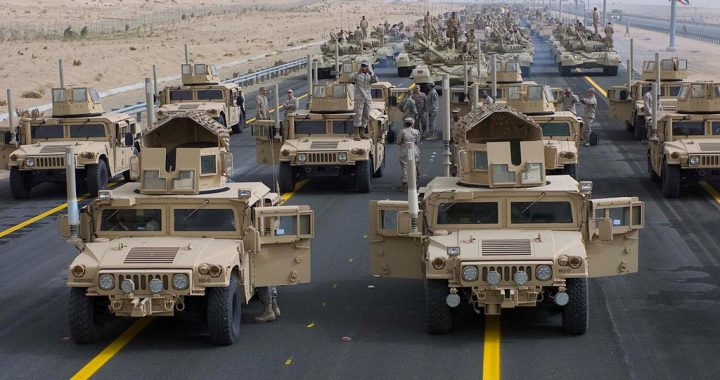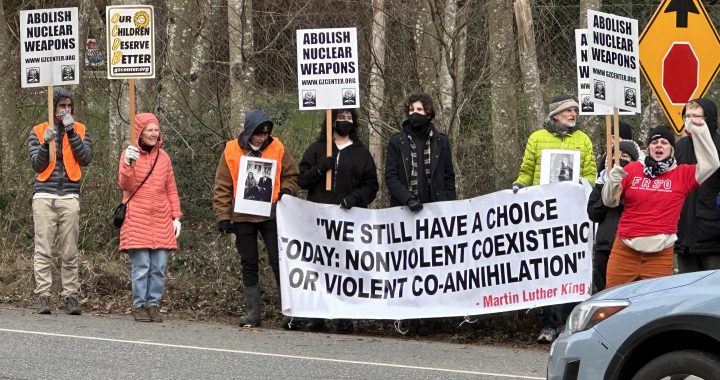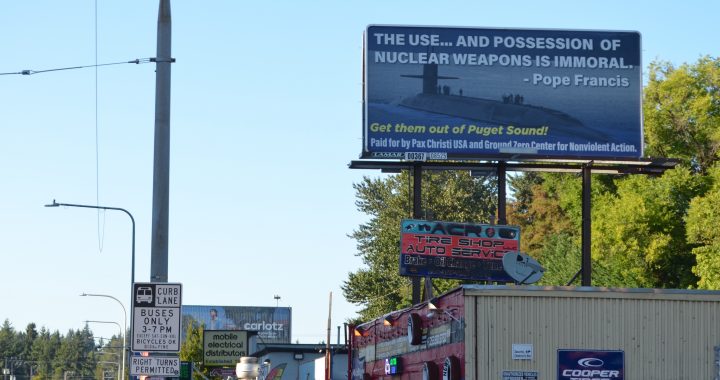Editor’s Note: This is a news release sent on April 21, 2022
Peace activists join with Environmental activists for Earth Day at Manchester fuel depot, largest Department of Defense fuel depot on the West Coast, near Port Orchard, WA
Contact: Kathy Railsback (208) 949-3004
Mary Gleysteen (360) 265-1589
Glen Milner (206) 365-7865
Peace activists and environmental activists will join for Earth Day at Manchester fuel depot, known formally as the Manchester Fuel Department (MFD), to protest hydrocarbon use by the U.S. Navy and the Department of Defense.
What: Peace and environmental activists join for Earth Day.
When: Saturday, April 23, 2022, Noon to 3:00 pm (NOTE: this is the day after Earth Day).
Where: Manchester State Park, 7767 E. Hilldale, Port Orchard, meet at Picnic Table No. 3, walk to Manchester fuel depot.
The Manchester Fuel Department (MFD) is the Department of Defense’s largest single-site fuel terminal in the United States. The depot provides military-grade fuel, lubricants and additives to U.S. Navy and Coast Guard vessels, and to those from allied nations like Canada. Records available from 2017 show over 75 million gallons of fuel stored at MFD.
The facility sits on approximately two miles of Puget Sound shoreline, storing product in 44 bulk fuel tanks (33 Underground Storage Tanks and 11 Aboveground Storage Tanks) on 234 acres. Most of the tanks were built in the 1940s. The fuel depot (tank farm and loading pier) is less than six miles west of Alki Beach in Seattle. 
Activists with Ground Zero Center for Nonviolent Action, 350 West Sound Climate Action, and Earth Care Not Warfare demand that the U.S. military reduce its carbon footprint while reducing its global military footprint on the planet. The U.S. military has approximately 750 military bases around the world and emits more carbon into the atmosphere than 140 nations.
If the U.S. military were a country, its fuel usage alone would make it the 47th largest emitter of greenhouse gases in the world, sitting between Peru and Portugal.
Conflicts induced or exacerbated by climate change contribute to global insecurity, which in turn, increase the chance of nuclear weapons being used. The effects of climate change can also feed the ambitions among some states to acquire nuclear weapons or different types of more useable or tactical nuclear weapons.
While climate change and the threat of nuclear war are the two major threats to the future of humankind and life on our planet, their solutions are similar. International cooperation to solve one of the problems—whether to abolish or tightly reduce nuclear weapons or to reduce greenhouse gas emissions—would greatly help with the solution of the other.
The Treaty on the Prohibition of Nuclear Weapons (TPNW) entered into force in January 2021.
While the treaty’s prohibitions are legally binding only in the countries (60 so far) that become “States Parties” to the treaty, those prohibitions go beyond just the activities of governments. Article 1(e) of the treaty prohibits States Parties from assisting “anyone” engaged in any of those prohibited activities, including private companies and individuals who may be involved in the nuclear weapons business.
Ground Zero member Mary Gleysteen stated, “An international agreement addressing climate change that had a similar structure to the TPNW would be a helpful start.
Our proximity to the largest number of deployed nuclear weapons in the U.S. at Bangor, and to the “Pentagon’s largest gas station” at Manchester, demands a deeper reflection and response to the threats of nuclear war and climate change.
A 2020 Freedom of Information Act response from the Navy to Ground Zero member Glen Milner showed that most of the fuel from the Manchester depot is sent to local military bases, presumably for training purposes or for military operations. The vast majority of the fuel is sent to Naval Air Station Whidbey Island. See https://1drv.ms/b/s!Al8QqFnnE0369wT7wL20nsl0AFWy?e=KUxCcT
One F/A-18F, similar to the Blue Angels jets that fly each summer over Seattle, consumes approximately 1,100 gallons of jet fuel per hour.
The Pentagon recently shut down a fuel depot near Pearl Harbor in Hawaii that was built during the same time period as the Manchester depot. The decision by Defense Secretary Lloyd Austin was based on a new Pentagon assessment, but was also in accordance with an order from Hawaii’s Department of Health to drain fuel from the tanks at the Red Hill Bulk Fuel Storage Facility.
The tanks had leaked into a drinking water well and contaminated water at Pearl Harbor homes and offices. Nearly 6,000 people, mostly those living in military housing at or near Joint Base Pearl Harbor-Hickam were sickened, seeking treatment for nausea, headaches, rashes and other ailments. And 4,000 military families were forced out of their homes and are in hotels.
_________________________________________________________________________________
The next Ground Zero Center for Nonviolent Action event is on May 7 at the Ground Zero Center in Poulsbo, and at the Bangor submarine base, in commemoration of Mother’s Day. Please see www.gzcenter.org.




